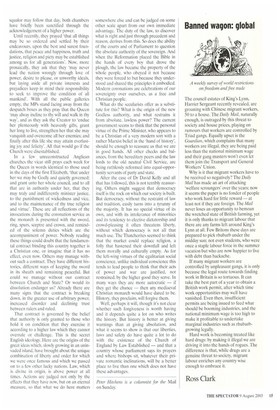Banned wagon: global
A weekly survey of world restrictions on freedom and free trade The council estates of King's Lynn, Harriet Sergeant recently revealed, are groaning with Chinese migrant workers, 50 to a house. The Daily Mail, naturally enough, is outraged by this threat to society and house prices, playing on rumours that workers are controlled by Triad gangs. Equally upset is the Guardian, which complains that many workers are illegal, they are being paid less than the national minimum wage and their gang masters won't even let them join the Transport and General Workers' Union, Why is it that migrant workers have to be received so negatively? The Daily Mail has made an art of attacking 'welfare scroungers' over the years; now it seems the paper is no fonder of people who work hard for little reward — at least not if they are foreign. The Mail never loses an opportunity to bemoan the wretched state of British farming, yet it is only thanks to migrant labour that there are any farms left around King's Lynn at all. Few Britons these days are prepared to pick rhubarb under the midday sun; not even students, who were once a staple labour force in the summer vacation but who are now happier to live with debt than backache.
If many migrant workers are controlled by unpleasant gangs, it is only because the legal route towards finding work in Britain is so tortuous. It can take the best part of a year to obtain a British work permit, after which time work opportunities may well have vanished. Even then, insufficient permits are being issued to feed what should be booming industries, and the national minimum wage is too high to make it profitable to undertake marginal industries such as rhubarbgrowing legally.
Hard work is becoming treated like hard drugs: by making it illegal we are driving it into the hands of rogues. The difference is that, while drugs are a genuine threat to society, migrant labour enriches any country wise enough to embrace it.


































































 Previous page
Previous page